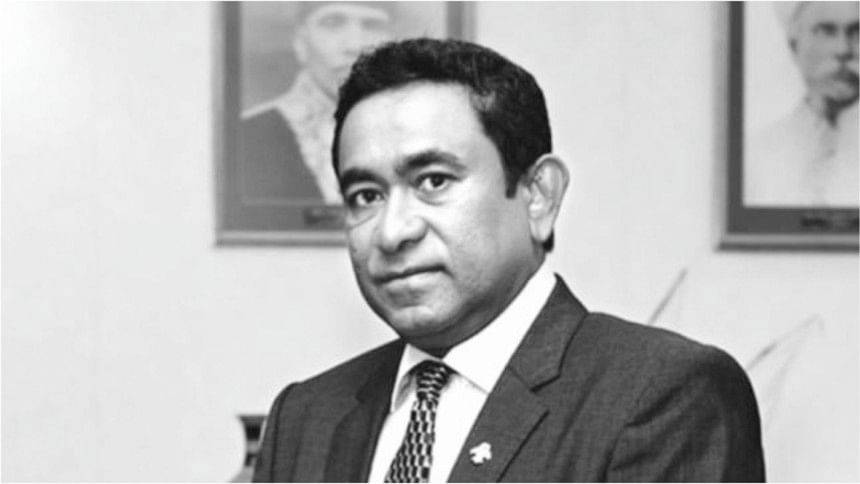Maldives: Political trouble in the nascent democracy

Maldives is once again witnessing political turbulence as the effort to remove President Abdulla Yameen was pre-empted by the ruling party with the help of a willing judiciary. The Maldives United Opposition (MUO) had submitted a no-confidence motion against the Speaker Abdulla Maseeh Mohamed on July 3, with 45 signatories including ten parliamentarians who had defected from the ruling Progressive Party of Maldives (PPM). The PPM challenged the validity of the no-confidence motion in the Supreme Court, asking for the court's intervention in this matter taking into account whether the former MPs of the party would be subjected to anti-defection measures. Interestingly, in March, a similar motion was defeated as 48 members of the People's Majlis voted against the motion while 13 opposition members were expelled from the Majlis. This incident had forced the government to change the law for moving a no-confidence motion in the Majlis. Instead of 15 signatures, 42 signatures are now required to move a no-confidence motion.
Pronouncing its decision on the plea of the attorney general, the Supreme Court of the Maldives said that such defection undermines multiparty democracy, disqualifying all the 10 MPs from parliament and asking the government to enact a new anti-defection law to further multiparty democracy and protect sovereignty. Interestingly, this anti-defection ruling was not applied to those MPs who had joined the ruling PPM in 2014 and 2016. The government has also used police and the army to prevent the opposition parliamentarians from demonstrating in front of the Majlis demanding the no-confidence motion against the Speaker to be taken up.
The Maldives, which transited to democracy in 2008, has been witnessing political instability and growing authoritarianism since the forced exit of President Nasheed in a "coup". The election of 2013 was controversial. President Yameen put his main political opponent Nasheed behind the bar and the judiciary convicted him of terrorism, which debars him from contesting any future election. He also silenced the opposition and crippled it by arresting many of its prominent leaders on charges of terrorism and corruption. Vice President Ahmed Adeeb was arrested on the charges of conspiracy to assassinate the president when a bomb went off on the boat that Yameen was travelling. Former Defence Minister Mohamed Nazim was arrested for keeping a weapon in his flat which is widely believed to have been planted to make his arrest and detention possible. Another opponent, the chairperson of Jumhoory Party, Qasim Ibrahim, who had been arrested in a bribery case, was given few hours to hire a lawyer to defend him in this case. Yet, Abdulla Yameen succeeded in emerging as a formidable political force until he had a dispute with his half-brother and former President Maumoon Abdul Gayoom, also the founder of the PPM, who is now expelled.
In August last year, Gayoom withdrew support to the government apparently due to his differences with Yameen over the government's decision to sell islands without competitive bids. His son who voted against this bill and was expelled from the party was followed by the resignation of his daughter, foreign minister Duniya Mamoon who has now re-joined the government. Apparently, the political rift had more to do with who would control the party. This was crucial as presidential election is not far. The rift came out in the open after Gayoom refused to nominate Yameen as the next presidential candidate of the party in 2018 election and declined to convene the Council. Gayoom's decision was challenged in the court and the judge found him "incapable of attending to the duties of his job" and handed over the party leadership to President Yameen. Gayoom was expelled from the internal committees of the PPM in June.
Judicial decisions have become arbitrary since the last presidential election when the court interfered in the process and suspended the Election Commission and the Deputy Election Commission. Contempt of Court is used as a tool to silence those who criticise the judiciary's proactive policy and its open siding with the government. A bill criminalising defamation was passed by the parliament undermining free speech and media freedom.
In March this year, five political leaders—including former Presidents Maumoon Abdul Gayoom and Mohamed Nasheed, along with Jumhooree Party leader Gasim Ibrahim and Adhaalath Party leader Sheikh Imran Abdulla—came together under the umbrella of Maldives United Opposition (MUO) and signed a pact to "restore democracy" in the country. Since then, there has been a tussle to upset the majority that Yameen enjoys and remove him from the presidency. PPM and its coalition partner Maldives Development Alliance (MDA) have 45 MPs in the 85-member Majlis. However, the MUO does not have the number in the parliament. And a politically motivated judiciary that is packed with supporters of the regime will not allow the opposition to succeed. Although it appears that President Yameen will use his influence to utilise the judiciary for his political purpose, the next election is not going to be a complete cakewalk for him as the Maldives await a turbulent politics with opposition stepping up their activities.
The internal division within the party and the consolidation of a united opposition would make it difficult for the Yameen government to have a smooth sailing. The regime has attracted international condemnation and was expelled from the Commonwealth, but its strategic location in the context of the Indian Ocean will make many countries to take a cautious approach towards Yameen's regime. Yameen also knows how to play the big powers and use the judiciary to override the constitution to have a smooth political sailing beyond 2018. But the question is if the opposition, including his half-brother, will allow this smooth sail.
Smruti S Pattanaik is a Research Fellow at the Institute for Defence Studies and Analyses (IDSA).





Comments